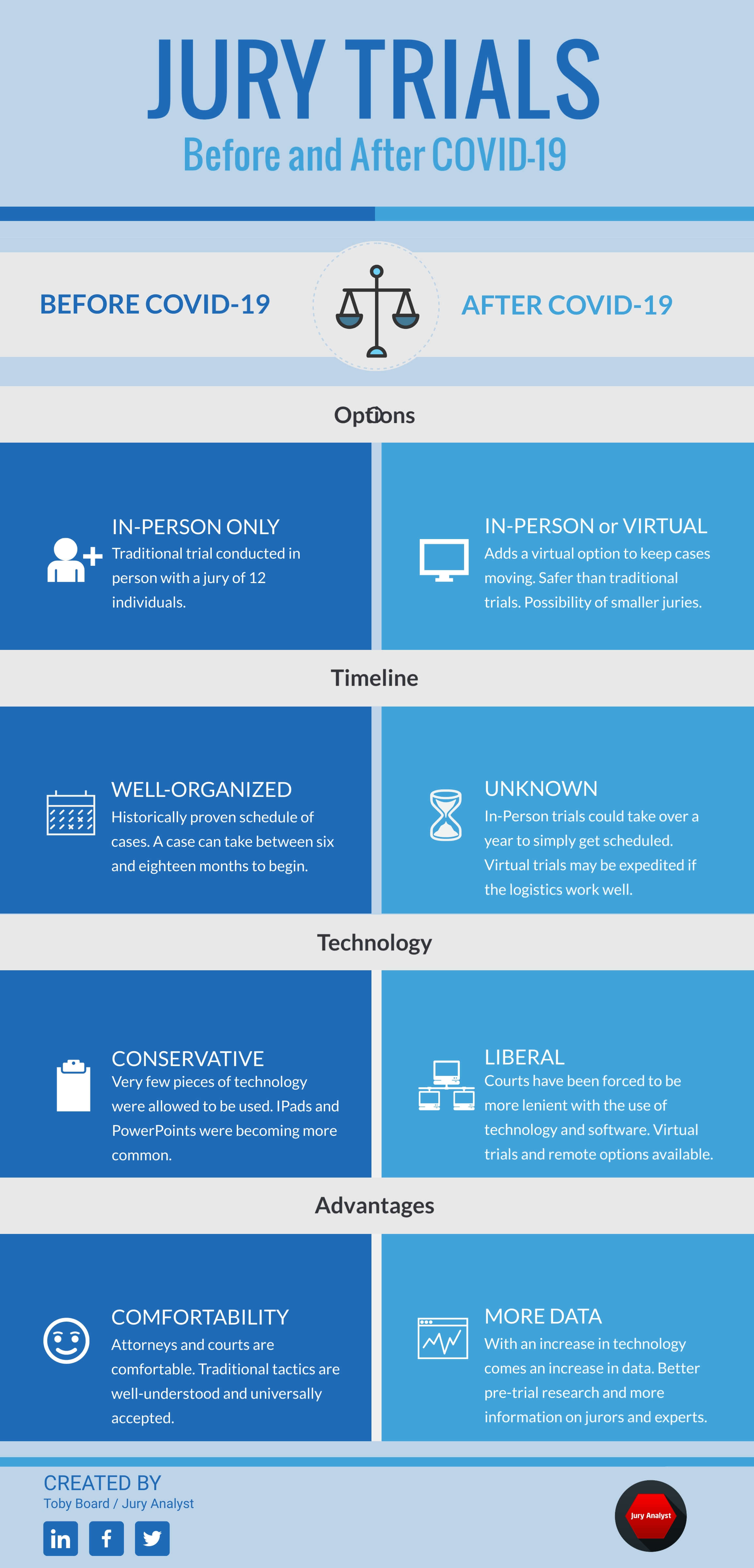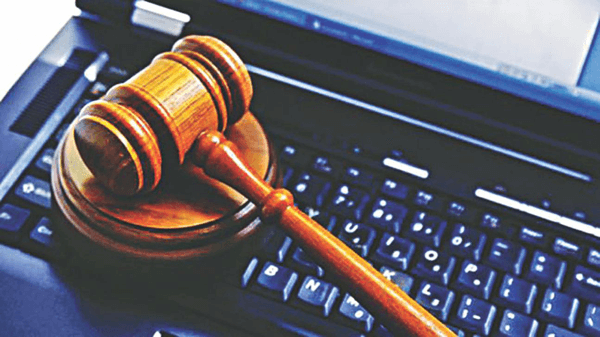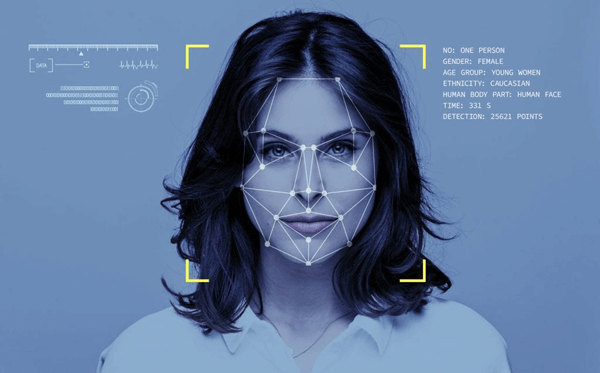The Effect of COVID-19
Over the past several months, the coronavirus has completely shaken the world. The extreme precautions necessary for public safety have created what many news sources are calling a “new normal.” This new normal, which includes the required use of face coverings and fear to maintain a certain distance of proximity to others, has created major hurdles for many industries. The hurdles are especially apparent in the United States Court System.
America was founded to provide and protect two very important rights: liberty and justice. Yet, the coronavirus seems to have, at least partially, take both. We cannot go to our favorite restaurants, watch our favorite sports teams, or in some cases even travel to another state. Our freedom has been restricted but we are still inherently free. We can still vote. We can still go to the store. We can still get married. Though we still have some sense of liberty, justice does not seem to be as enduring in these times.
Our justice system, one of the fundamental institutions of the United States, was ill-prepared for this type of crisis. Though our courts have survived major terroristic acts and even wars, the coronavirus has completely stopped them in their tracks. Without the courts and our justice system in motion, what happens? The answer is nothing until the courts adapt their archaic policies and procedures to be more modern and technologically advanced. Luckily, our court system quickly realized the need for change. They began immediately enacting new changes to keep at least some type of progression in cases. Technological changes have been by far the most beneficial and widely used tactic to battle the logjam of cases caused by this pandemic.

History of Technology in Court

Though some technology is allowed in courts, very few attorneys have taken advantage of it. The use of new-age technology in court takes quite a long time due to the court and many attorneys wanting to cling to traditional tools and tactics. In 1999, federal court policymakers pushed for the use of more technology in courtrooms. They created the courtroom technology manual, which was an in-depth dive into why technology needed to be integrated into the courtroom and how it could be done. In 2001, the American Psychological Association, the leading organization in psychology in the United States, stated that implementing the use of new-age technology can only help court cases by allowing behavioral specialists and data analysts to assist attorneys. Unfortunately, this manual and the American Psychological Associations’ comments became quickly outdated. The technological age that occurred from the mid-2000s up until today quickly left the courtroom technology manual and other ideas for the use of technology in court outdated.
Over the next decade or so, courts began to slowly allow more technology in the courtroom. Projectors became the norm. PowerPoint presentations are used in nearly every case. Some court filings were allowed to be done online. Some courts even began to allow the use of laptops and tablets. Though the execution of technological changes in court was minimal, there was never a shortage of ideas. Many attorneys and policymakers discussed the possible use of videoconferencing software, remote depositions, and even virtual trials. But these were never fully enacted and were oftentimes done on a temporary or testing basis.
However, this all changed in 2020 with the COVID-19 crisis. COVID-19 hit and a majority of courts became paralyzed by their traditional ways and desperately tried to implement technological advances that other fields have been using for years. COVID-19 kickstarted a revolution of technological change in many industries including in the United States Court Systems. It was the catalyst for change that the U.S. court system had been needing. It took many of the ideas and projects that were often discussed but never implemented and catapulted them into immediately executed tools and tactics. We are now seeing trials conducted via videoconferencing software. Remote depositions are becoming the norm. Even remote mediations are being conducted. It would seem that times are drastically changing in the U.S. court system.
Changes Due to COVID-19
Tasks Done Remotely
Many traditional tasks will be conducted remotely. Depositions are the easiest to implement due to remote depositions being more common than other remote tasks. These remote depositions can be conducted on common electronic devices such as cell phones and tablets. They, of course, need to be monitored closely and must be approved by both parties.
Remote jury selection is another change we may soon see. Individuals may be able to fill out supplemental juror questionnaires online in the comfort of their homes to limit the number of individuals who need to meet in-person for jury duty. Even remote e-discovery is becoming popular. Some firms have even created their own software. This removes the logistical issues involved with the discovery phase and provides a solution that is streamlined. It allows attorneys, during this crisis, to collect, review, and even exchange information about a case more easily without face-to-face interaction.
Virtual Becoming an Option
Virtual mediations and arbitrations are becoming commonplace. As trials get pushed back further and further and the logjam of cases in metropolitan jurisdictions pile up, attorneys on both sides are becoming more open and willing to use mediation and arbitration and have even become comfortable with using virtual versions of these services. The logistics for these virtual services are much simpler. No one has to be present face-to-face. While this may be uncomfortable for some attorneys and firms used to doing things in person, the results do not differ, and practice and time will create comfortability with things being done virtually. Virtual mediations and arbitrations work like many virtual solutions to problems in these trying times, through videoconferencing software. Again, many firms and companies have created their own software to pair with Zoom to help get more accurate transcriptions and facilitate the exchange of documents.
More Leniency with Technology
Some jurisdictions have continually banned laptops and tablets in court. Others wouldn’t allow supplemental juror questionnaires to filter out potential bad jurors beforehand. These small things will likely change due to COVID-19. Courts have to realize that technology is for the benefit of everyone, it is not a danger. Technology makes life easier and requires less face to face interaction, which is important during this current health crisis. Some jurisdictions are even allowing courts and jury selection to be filmed and broadcasted.
Changes in How Law is Taught and Trained
Traditional approaches to trial are not disappearing, but contemporary approaches are on the rise and may soon become the norm. We will likely see many law schools change some of their class material to fit these technological changes that COVID-19 has pushed forward. Most law schools follow the traditional ideas and tactics that have been used for decades with little change. However, it is becoming increasingly more important that the future attorneys of the United States are open to the use of and able to use these new technological services. Law school has already changed drastically. Most law schools are doing fully virtual classrooms, meaning that they are doing these classes from the comfort of home. Even the most liberal of law schools are only doing a “hybrid” teaching method, meaning that a majority of the classes are taught online and some allow clusters of students to come to class once a month or so.
New Way to See Expressions

Facial expressions are very important for attorneys to see. They want to know how their jurors react to specific information, whether they wince when they see a picture or smile when they hear a ridiculous claim. With the requirement of facial coverings in the courtroom currently, they lose this very important aspect of the trial. Many attorneys are against a change in environment, from in-person courtrooms to virtual, but they must realize that virtual trials are far better than in-person trials currently when it comes to facial expressions. All in-person trials are going to require face covering, which will suppress and hide nearly all facial expressions. Alternatively, video conferencing software, such as Zoom, allows courts to conduct their trials and show a very detailed and in-depth analysis of facial expressions and reactions. The jurors and witnesses ‘ faces will be enhanced far more than in an in-person trial. Additionally, facial analytics software can easily be used to assess jurors’ emotional reactions to information and, during pre-trial, can be used to analyze the authenticity and credibility of witnesses and expert depositions.
Pre-trial Research Becoming More Advanced and More Common
Pre-trial research is important. However, many firms choose to do the research themselves. With the changes implemented due to COVID-19 and court being more lenient with supplemental juror questionnaires and remote depositions, jury consultants are becoming more accurate and more beneficial for your case. These changes will allow jury research companies, like Jury Analysts, to gather more data about the jury and your case in hopes of selecting less biased and more robust juries. Additionally, they are able to test how potential jurors in your jurisdiction react to remote deposition videos of eyewitnesses and experts. Depositions are a cornerstone of trial preparation, however, remote depositions are less comfortable for most attorneys and, if done incorrectly, can lead to poor quality testimony and negative outcomes for your case. Practice makes perfect, but so does testing your results to make sure your videos are court-ready and going to have the impact you are looking for.
Are These Changes Permanent?
We really do not know the permanency of these changes. Most researchers and attorneys believe that many, if not all, of these changes, will at the least become available options for future cases. Virtual bench trials may become more common. Remote depositions were already on the rise but the forced use of them may cause them to become the norm rather than a tactic only used by the more progressive firms. It is hard to tell what the future of the court system will look like. One thing we do know for sure is that if this type of health crisis continues or occurs again, the courts will be better prepared and ready to keep trials and cases moving because we, as Americans, have the right to justice and a pandemic should not stop that.
